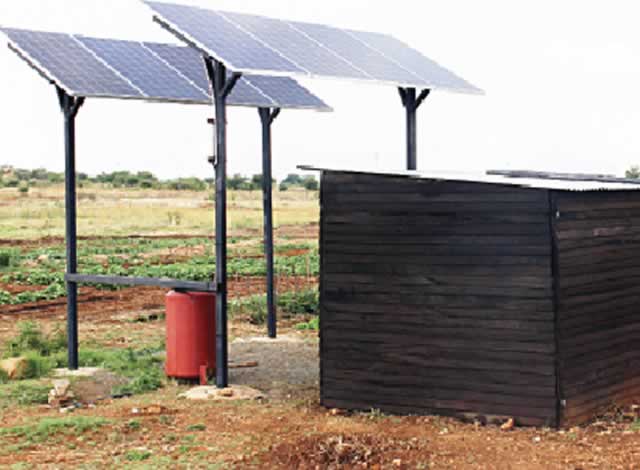Sizinda solar irrigation project to benefit high-density suburbs

Andile Tshuma Business Correspondent
BULAWAYO-based non-governmental organisation Zimbabwe Democracy Development Trust (ZDDT) has set up a solar-powered irrigation project that will benefit more than 180 households in two high-density suburbs.
The project – the first of its kind in Bulawayo – is located in Sizinda and will benefit households in Ward 21, which covers Tshabalala, Tshabalala Extension and Sizinda suburbs.
Ward 21 councillor Reuben Matengu said the project would assist vulnerable members of the community.
“The project is meant to benefit those people in our community who are unable to generate any income. It mostly targets the elderly, unemployed, recently retrenched and child headed families in this ward,” he said.
Zimbabwe’s economic challenges, which in Bulawayo has been characterised by massive deindustrialisation, has hit hard on already poverty-stricken communities.
The challenges have devastated households in the city’s high-density suburbs, many of whom relied on income from breadwinners employed by factories and companies that have closed due to high operating costs and the country’s liquidity crunch.
Under the ZDDT project, which is in its first phase, 90 people have already been recruited, with 69 having started working on their pieces of land.
Participating households have each been allocated 100 square metres of land, or 20 beds, to plant a variety of vegetables for personal consumption and commercial purposes.
Under the project, a solar panel is used to power an engine that draws water from underground.
Gardeners then use hosepipes to water their vegetables from a number of taps dotted around the site.
Beneficiaries said the solar panel enabled them to continue working despite Zimbabwe Electricity Supply Authority (ZESA) power cuts, which have worsened in the past three months because of generation problems at the Kariba Power Station.
Makiseni Chiwara, a National Railways of Zimbabwe pensioner, said: “As long as the sun is shining, our engine runs and we can water our gardens. This is also cost effective; I wonder how much it would cost to use a generator or to pay for ZESA’s power to run this huge engine all day.”
Other beneficiaries said they expected to reap good yields so that they could sell some of their produce and use the money for rent, groceries and school fees.
Increased retrenchments during 2015 have left many families unable to afford basic commodities or to continue sending their children to school.
Tshabalala resident Lance Maseko, 22, who is unemployed and was watering spinach and cabbages when our news crew visited the project site, said: “I’m watering these vegetables for my grandmother who is attending a funeral today. I’m very happy because she will no longer have to worry about what to feed us each day. So far, we’ve eaten the spinach from this garden. I hope that the crops will grow well so that she produces enough to sell and buy other stuff we don’t have.”
Sizinda resident Martha Nkhoma, who was working together with her husband at their garden when she was interviewed, said: “We’re raising orphans and things sometimes get tough for us. We hope we’ll be able to sell our produce and pay for the children’s school fees and other school requirements. We could never be more grateful to the leaders in our community for bringing such a project to us.”
However, some beneficiaries of the project pointed out that they lacked farming skills, saying they only knew how to nurture vegetables such as spinach, carrots and choumolia.
Howard Sembeya, a recently retrenched Sizinda resident, said: “The project is a noble innovation for our community. However, the problem is that very few of us know how to farm fancy crops such as broccoli, cauliflower, radishes and egg plants (brinjals).”
Matengu noted that trained agricultural professionals sometimes supervised gardeners at the project site but said they were overwhelmed by the number of people in need of assistance.
He said: “Currently there are about eight gardening instructors that come to assist at the project site, but there are so many people who need coaching as most of the beneficiaries have never ventured into any farming activities before.”
Angela Mason, the ZDDT project co-ordinator, said her organisation aimed to unite communities and improve the lives of people through self -help projects.
“The ward 21 solar-powered irrigation project is a pilot project,” she said. “We’ve been working on other irrigation schemes, but this one hasn’t been done anywhere else.”
Mason added: “We’re happy with the progress and are humbled by the response and commitment from our beneficiaries. We’re happy to be making an impact in the community.”
She said ZDDT believed in empowering communities with sustainable projects, instead of just giving aid through short-lived donations.
The second phase of the project will involve allocating farming space to another 90 households. Beneficiaries were chosen after public notices were posted inviting residents of Tshabalala and Sizinda to approach the ward councillor for vetting.
John Sigauke, a city parks officer, said: “I wanted a garden as well but I didn’t qualify. Nonetheless, I’m happy that there was transparency in the selection criteria and most of the vulnerable and needy members are benefiting.”
Alice Ndlovu, a Sizinda resident who has already benefited from the irrigation project, added: “My husband lost his job at railways (NRZ) and life has been tough for us. Sometimes I borrow five rand from my neighbours just to buy a tomato and onion for a single meal’s relish. I can’t have a garden of my own at home because my landlord will complain about the water bill. Now that I’ve a garden, I’ll work hard because I want to see the fruits of my sweat.”











Comments